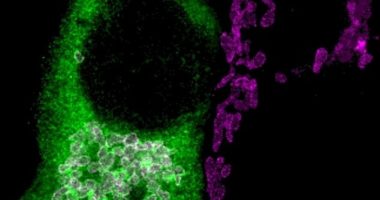
Adults will adopt the same facial expressions they use when speaking and playing with babies as they do with their pet dogs, a new study has found.
Scientists from Eötvös Loránd University in Budapest, Hungary, determined humans use the same six overly animated expressions in both scenarios.
Studies have previously found there is a similar cross over in the high pitched tone used to speak with pets and babies, too.
The study identified six common expressions, ranging from the ‘special happy’ face to the ‘mock surprise’ face and the ‘fish’ face, among the 42 participants.


Man’s best friend: Scientists in Hungary have cracked the code in speaking to dogs – and believe there are six faces humans pull when communicating with their pets


Mock Surprise Happy: Big smile, eyebrows and cheecks raised


Fish Face: Scrunched lips and slightly open mouth


Special Happy: Broad smile with cheeks raised and mouth slightly open


Mock Surprise Brow: Raised eyebrow, a look of mild suspicion


Mock Surprise: Raised eyebrows and wide-open eyes and mouth


Mock Surprise Mouth: Open mouth but no eyebrow change
The babies in the study ranged from three months to 17 months old, while the dogs were up to 12 years old and included collies, dachshunds, poodles and mongrels, The Telegraph reported.
Most commonly used is the ‘special happy’ face; an intense smile with a slightly open mouth and expressive eyes.
Another of the faces is ‘mock surprise’; in which the mouth is open and brows raised.


Scientists have determined there are six faces adults pull when talking to babies and dogs
A single brow raised is the ‘mock surprise brow’, which is often accompanied with a look of confusion.
The fish face is also one of the most common faces; a crinkled pout with a slightly open mouth.
Some of these faces are combined to make new expressions, like the ‘mock surprise and special happy’ combination.
The scientists from the study concluded: ‘Our study provides evidence for the first time that infant-directed and dog-directed communication can be characterised by similar specific facial expressions of female and male speakers.
‘Our results indicate that all six facial expressions are typical in both infant- and dog-directed communication but rare or completely missing from adult-directed communication.’
Researchers previously found ‘dog-speak’ is an important way to bond with a pet.
Scientists found that dogs need to hear words spoken rhythmically in a high-pitched emotional voice in order to find it relevant.
Dr Katie Slocombe, a researcher from the University of York’s Department of Psychology, said: ‘A special speech register, known as infant-directed speech, is thought to aid language acquisition and improve the way a human baby bonds with an adult.
‘This form of speech is known to share some similarities with the way in which humans talk to their pet dogs, known as dog-directed speech.








